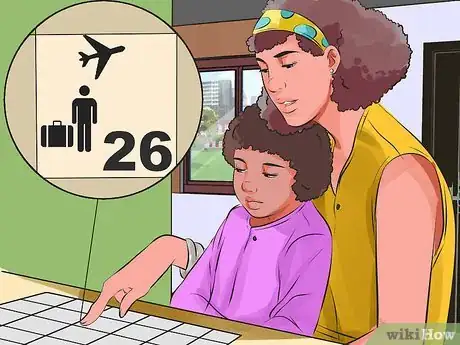This article was co-authored by Tasha Rube, LMSW. Tasha Rube is a Licensed Social Worker based in Kansas City, Kansas. Tasha is affiliated with the Dwight D. Eisenhower VA Medical Center in Leavenworth, Kansas. She received her Masters of Social Work (MSW) from the University of Missouri in 2014.
This article has been viewed 91,093 times.
Is a parent absent answering the call of duty? Did they move across the country for a new job? No matter what the reason, it can be difficult to explain the absence of a parent to children when you're the partner left behind to care for them. The right approach depends on the reason for the absence, the possible outcomes, and the age and maturity levels of the children. Read these steps and decide which work best for your situation.
Steps
Approaching the Topic Based on the Circumstance
-
1Be honest about a parent who has never been involved. If your child has never met the other parent or if the parent has been absent for a long time, be prepared for lots of questions. Your child will likely want to know who the parent is, where he is, and why he is not involved. Questions about an absent parent will most likely begin when your child starts school and begins learning more about classmates' families.[1]
- Answer basic questions about who the absent parent is, and consider sharing a photograph if you have one.
- Tell your child that all families are different and remind her about all the people who love her. Try using examples from books and movies, or from real life, to teach her about all different kinds of families
- Be upfront about the likelihood of your child ever meeting the other parent. If the other parent has no interest in being involved or you are not able to contact them, don't get your child's hopes up by promising an eventual meeting. Make sure you emphasize that this is not the child's fault in any way.
- Keep your personal feelings to yourself as much as possible. You can share more details about the circumstances of the other parent's absence as your child gets older, but try not to say negative things about the other parent.
-
2Prepare your child for business-related absences in advance. If the absence is predictable and regular, tell your child when the other parent is coming back by showing them a calendar and talking it over with them. Discuss regular travel as a family, so that it becomes a normal expectation within the family and all members can be prepared for the parent to miss occasional special events, such as sports games and celebratory occasions, and can prepare well in advance.
- If business trips regularly occur with little warning, be sure to explain that as well so there will be no surprises.
- Help your child keep in touch with the absent parent by arranging phone calls or video chats. You can also encourage the parent who is away to bring the child back souvenirs from their travels.
Advertisement -
3Explain military absences according to the advice that your deployment officers provide. Be sure to give your child the opportunity to express her feelings and concerns, and offer her plenty of support.[2]
- Be as honest as the age of your child permits. A toddler only needs to know that daddy will be back by Christmas, while a teenager will need to know the truth about the length of the deployment and where the parent will be.
- Include your child in your communications with the absent parent, including letters and phone calls, as much as possible. If regular contact is not possible, explain to the child that her mom or dad really wants to talk to her, but can't because of work.
-
4Explain sudden absences according to what has happened and the age of your child. No matter what the reason for the absence, be sure to make it clear that it is not the child's fault. Younger children in particular may feel as though they are responsible for the absence if you don't assure them otherwise.
- If the absence is unpredictable (if, for example, a parent is in the hospital after an accident), explain what has happened, give a generous estimate of when the parent will be back, and keep your child updated on progress and changes to the dates.
- Try to keep your child from worrying. Answer their questions and make sure they understand the situation, but don't provide them with details that might confuse them more.
-
5Be honest if the absence is forever. Be sure to tell your child that the absence has nothing to do with them, and answer any questions they have honestly.
- If a parent has separated from the marriage and family, you have to be honest without letting any anger get in the way. For example, you could say, "Daddy loves you but was unhappy with his life, so he's gone to live in Vegas. We'll do our best to keep in touch but it will be hard sometimes. I can give you his address if you'd like to write and how he is doing."
- If a parent passes away, be open and honest, encourage the child to express their emotions, and help them cope with their grief as best you can.[3]
Supporting Your Child Through the Absence
-
1Spend extra time with your child. While you should not try to replace the missing parent, you can try to fill some of his or her roles. If the absence is permanent, you may consider becoming more involved in some of the special activities the absent parent used to be involved with. If the absence is temporary, keep your own style and be thoughtful about telling your child that some activities are reserved for the other parent, in order to keep those things special and to ensure retention of the sacredness of their bonding.
-
2Encourage contact. If the absence is short-term, encourage the absent parent to stay in touch with the child via phone, video chat, letters, and email as much as possible. Remind your child that her other parent is still very much a part of her life, even though he is far away. If the absence is long-term, try to encourage some level of contact if possible, even if it is only an occasional phone call or letter.
- Let older children decide for themselves how often they wish to communicate with a long-absent parent.
- Try to communicate to the absent parent that contact is very important and that it would mean a lot to your child, even if they don't have a close relationship.
-
3Share memories. Whether your child's other parent has passed away or is permanently absent for another reason, share positive memories of the absent parent. Your child will likely have questions about what her other parent was like, especially if the absence began when she was very young. Answer these to the best of your ability, but always keep things positive.
-
4Answer questions and tell the truth. This doesn't mean that a child needs to know every detail about the other parent's life, but don't tell white lies to make her feel better about the situation. If the parent is dealing with a problem such as drug addiction and you feel the child is too young to hear about these specifics, just tell her something general, such as, "Mommy is dealing with some personal problems, but that doesn't mean she's not thinking about you." [4]
-
5Avoid hostility. No matter how you may feel about the absent parent, try not to express negative emotions to your child. It is up to her to decide how she wants to feel about her absent parent. Trying to turn your child against her other parent may lead to behavioral problems.[5]
-
6Offer your child access to counseling. Every child is different, and some may benefit from talking to a professional about how they feel about the absence of their parent. You should definitely encourage counseling if you notice any changes in your child's behavior that you suspect may be related the the absence.
- Support groups are also a great resources for many children, especially those dealing with the death of a parent, or those whose parent is incarcerated. Talking to other children who have had similar experiences can help them understand and deal with their own feelings.
References
- ↑ https://onefamily.ie/wp-content/uploads/Level-4-Relationships-Explaining-an-Absent-Parent.pdf
- ↑ http://www.nasponline.org/resources/crisis_safety/parents-called-to-active.pdf
- ↑ http://singleparents.about.com/od/communicatingwiththekids/f/absent_father.htm
- ↑ http://www.babycenter.com/0_how-to-talk-to-your-child-about-nontraditional-family-types_3657068.bc
- ↑ http://www.socialworktoday.com/archive/102708p26.shtml








































































